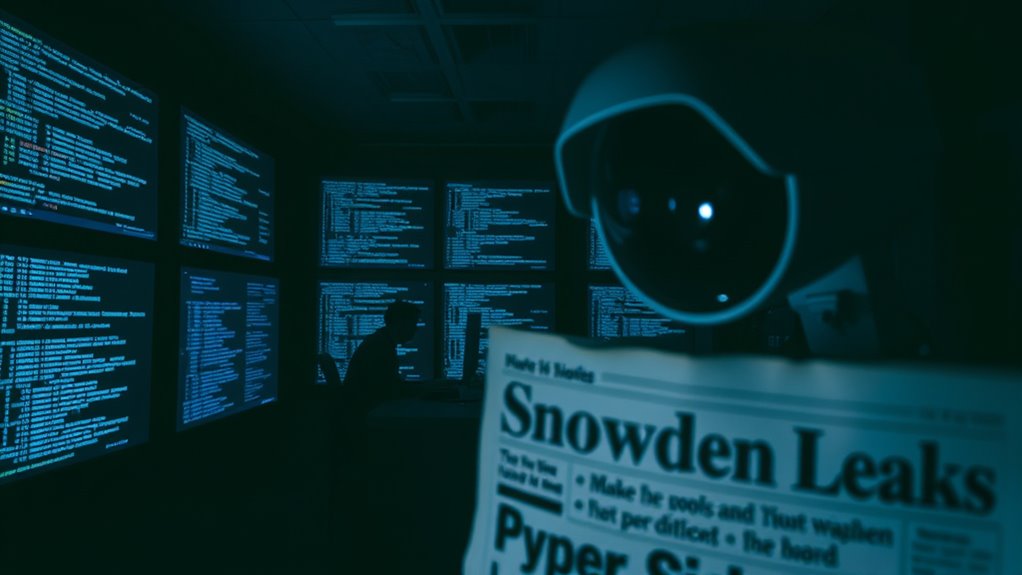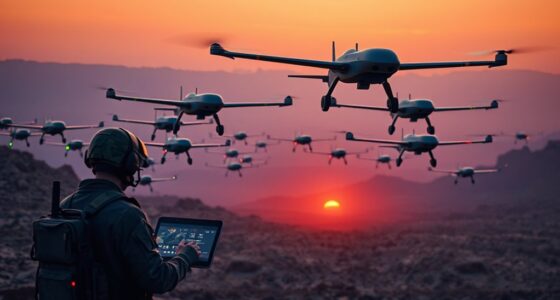The Snowden leaks in 2013 changed how you think about surveillance. They revealed the NSA's bulk data collection without warrants, sparking outrage over privacy violations. This led to laws like the USA FREEDOM Act and a push from tech giants for transparency in government requests. The fallout also raised ethical questions about AI in surveillance and its impact on civil liberties versus national security. There's a lot more to uncover on this complex topic.
Key Takeaways
- Snowden's revelations in 2013 exposed the NSA's extensive surveillance practices, sparking public outrage and debate over privacy and civil liberties.
- The leaks prompted legislative efforts like the USA FREEDOM Act to curb bulk data collection and enhance privacy protections.
- Major tech companies responded by advocating for transparency in government surveillance, forming coalitions to push for reforms and user privacy rights.
- The ethical implications of AI in surveillance were highlighted, raising concerns about bias, accountability, and the potential chilling effects on free speech.
- The national security versus civil liberties debate intensified, leading to legal rulings that questioned the legality of mass surveillance practices under the Foreign Intelligence Surveillance Act.
The Impact of Snowden's Revelations on Public Awareness of Surveillance

When Edward Snowden leaked classified information in June 2013, he ignited a firestorm of public awareness about government surveillance that many hadn't previously understood.
His revelations exposed the NSA's extensive practices, including the bulk collection of millions of Americans' phone records without warrants. You witnessed how programs like PRISM and OPTIC NERVE illustrated the indiscriminate nature of data collection, prompting outrage and calls for accountability.
Public discourse shifted dramatically as discussions on privacy rights and civil liberties became mainstream. Advocates rallied for transparency, leading to legislative proposals like the USA FREEDOM Act aimed at reforming surveillance practices.
Snowden's disclosures fundamentally changed how you perceive government surveillance and heightened your awareness of the importance of protecting privacy rights. These events echoed concerns similar to how emotional abuse can manipulate individuals' understanding of their rights and well-being in relationships.
Shifts in Legislative Responses to Government Surveillance Practices

Snowden's revelations not only sparked outrage but also prompted a wave of legislative responses aimed at reforming government surveillance practices. The USA FREEDOM Act emerged as a key proposal, seeking to limit bulk data collection by the National Security Agency (NSA) and enhance transparency. In light of public outcry, legislators like Senator Dianne Feinstein pushed for stronger privacy protections and annual reports on phone records accessed by the NSA. Tech firms, including Google and Facebook, joined the call for reform, showcasing a shift in corporate responsibility.
| Legislative Proposal | Key Focus | Status |
|---|---|---|
| USA FREEDOM Act | Limits bulk data collection | Passed |
| Surveillance Transparency Act | Restricts phone metadata collection | Proposed |
| Feinstein's Reforms | Enhances privacy protections | In Progress |
| Bipartisan Initiatives | Balances national security with civil liberties | Ongoing |
The Tech Industry's Reaction to the NSA Leaks

In the wake of the NSA leaks, major tech companies reacted swiftly, recognizing the urgent need to address public concerns over privacy.
The tech industry, including giants like Google and Microsoft, filed lawsuits in FISA court for greater transparency regarding government surveillance requests. They also formed the Reform Government Surveillance group, advocating for accountability in light of the leaks' reputational damage.
Aiming to limit government surveillance practices, these companies lobbied Congress for legislative reforms that would enhance disclosure of data requests.
The revelations underscored serious concerns about user privacy and trust, prompting a public relations campaign that included an open letter to the president and Congress, stressing the necessity for surveillance reform and increased transparency in government actions.
Ethical Implications of AI in Surveillance Systems

How does the rise of AI in surveillance challenge our understanding of ethics and privacy? As AI technologies increasingly monitor individuals, several ethical implications emerge:
- Discrimination: AI algorithms can perpetuate biases, leading to unfair treatment of marginalized groups.
- Privacy Invasion: Real-time surveillance often occurs without consent, infringing on personal privacy and civil liberties.
- Chilling Effects: The fear of being watched may discourage free speech and public assembly, stifling democratic engagement.
- Lack of Accountability: Insufficient transparency in AI surveillance systems raises concerns about governmental overreach, threatening individual rights.
These factors compel us to rethink our approach to AI in surveillance, emphasizing the need for ethical guidelines that prioritize transparency and accountability while safeguarding privacy and civil liberties.
The Ongoing Debate Between National Security and Civil Liberties

As the debate over national security and civil liberties intensifies, many find themselves questioning the extent to which governments should monitor citizens to protect against threats.
Snowden's revelations about the NSA's extensive surveillance practices, particularly regarding phone records, ignited concerns about the violation of privacy rights.
The U.S. Court of Appeals ruled that the NSA's mass surveillance violated the Foreign Intelligence Surveillance Act, highlighting the legal and ethical implications of such operations.
Advocacy groups like the ACLU celebrated this ruling as a win for civil liberties, urging ongoing scrutiny of government actions.
Legislative changes, like the USA FREEDOM Act, aimed to limit bulk data collection, emphasizing the need to balance national security with the protection of constitutional rights.
Frequently Asked Questions
What Did Snowden Reveal About Surveillance?
Snowden revealed that the NSA was conducting mass surveillance on millions of Americans without warrants.
You'd learn that they collected extensive data on phone records, including who you called and when. Programs like PRISM allowed access to user data from major tech companies, while others, like OPTIC NERVE, captured images from webcams.
His disclosures raised serious privacy concerns, illustrating the government's intrusion into personal lives and prompting a debate about surveillance versus individual rights.
What Was the Impact of the Snowden Leaks?
When the curtain lifted on the NSA's secretive surveillance, it sent shockwaves through society.
You saw a surge in public outrage, with calls for reform echoing louder than ever. The courts validated these concerns, declaring the program unlawful.
Tech giants rallied for transparency, while international relations soured as foreign leaders realized they weren't immune to spying.
This seismic shift forced a critical examination of civil liberties versus national security, reshaping the conversation around privacy.
What Software Does Edward Snowden Use?
Edward Snowden uses several software tools to enhance his privacy and security online.
You might find him using the Tor network for anonymous browsing, while he advocates for encryption software like GnuPG for secure emails.
For messaging, he relies on Signal to keep communications private.
Additionally, Snowden prefers secure operating systems like Tails, which leave no trace, and employs VPN services to protect his internet connection and maintain anonymity.
How Did the US Respond to Snowden?
Imagine a wake-up call that jolts you from a deep sleep; that's how the U.S. reacted to Snowden's revelations.
Initially, the government denied any wrongdoing, but as public outrage grew, it faced mounting pressure for reform.
The Ninth Circuit ruled the NSA's mass surveillance unlawful, highlighting the need for transparency.
Lawmakers and the Obama administration engaged in discussions to balance national security with civil liberties, reshaping the surveillance landscape in the process.
Conclusion
In the wake of Snowden's revelations, the landscape of surveillance transformed like a chameleon, shifting colors in response to public outcry. You've witnessed the tension between national security and civil liberties play out like a gripping drama, with tech giants caught in the crossfire. As AI inches closer to the heart of surveillance, the debate rages on, reminding us that freedom and security dance a delicate tango—one that requires our vigilant attention and thoughtful discourse.









